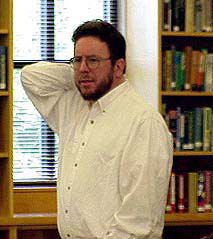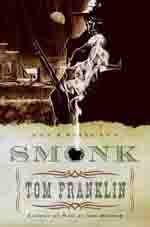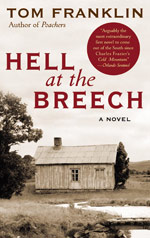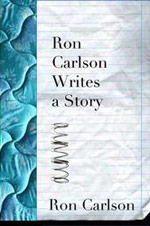- Welcome
- Noir Zine
- Allan Guthrie
- Books
"...those who enjoy the darker side of the genre are in for some serious thrills with this..."
Laura Wilson, The Guardian

Published in the UK by Polygon (March 19th, '09) and in the US by Houghton Mifflin Harcourt (Nov '09).
Tom franklin
interviewed by Rob McClure Smith
 Tom Franklin was raised in rural southwest Alabama. His first book was the highly regarded short story collection, Poachers (1999) and his stories have been included in anthologies such as New Stories from the South; The Year's Best, 1999; Best American Mystery Stories, 1999 and 2000; and Best Mystery Stories of the Century. Franklin has since published two critically acclaimed novels, Hell at the Breech (2003) and Smonk (2006). Having previously worked as a heavy equipment operator at a sandblasting grit factory, a construction inspector in a chemical plant, a clerk at a hospital morgue, and as the cleaner up of hazardous waste sites, he is now the Writer-in-Residence at the University of Mississippi in Oxford, Mississippi.
Tom Franklin was raised in rural southwest Alabama. His first book was the highly regarded short story collection, Poachers (1999) and his stories have been included in anthologies such as New Stories from the South; The Year's Best, 1999; Best American Mystery Stories, 1999 and 2000; and Best Mystery Stories of the Century. Franklin has since published two critically acclaimed novels, Hell at the Breech (2003) and Smonk (2006). Having previously worked as a heavy equipment operator at a sandblasting grit factory, a construction inspector in a chemical plant, a clerk at a hospital morgue, and as the cleaner up of hazardous waste sites, he is now the Writer-in-Residence at the University of Mississippi in Oxford, Mississippi.
Rob McClure Smith: I've seen your fiction called "industrial gothic" and also "rural noir." How do you feel about those descriptions of your work?
Tom Franklin: I like ‘em. I'm interested in genre because it seems to insist on boundaries, but then the "genre" writers I love always push these boundaries. Who writes dialogue better than Elmore Leonard or, as I'm just now discovering, Richard Price? Who probes deeper into the mind than Dennis Lehane, uncomfortably so, too? These are all "crime" writers. Well, shit, if they’re "crime writers" I want to be a "crime" writer too then. Who flat-out tells a story better, speaking of "genre," than Stephen King? He's a writer I'm fascinated by. I read Lisey's Story a while back, and the man’s still got it.
RMS: It's also been said—at least as regards the last two novels—that you write "southerns." That’s your own word, right?
TF: Yep. Actually, industrial gothic was mine, too, I think. I'm pretty sure. Smonk was almost called Smonk: a Southern but my editor didn't like it. She thought it was confusing. I said, "No, like, not a western," and she said, "Yes, I get it. It's still confusing." Hell at the Breech is not a southern. It's just a book set in Alabama. To be a southern, something has to yarn a bit more, push at genre boundaries a little, or a lot.
RMS: So you started writing back in the day with. . .?
TF: Comic books. I did my own series, several, illustrating and writing, filling in the little dialogue balloons, drawing the monsters, the spaceships. My longest running one was Starfire about a spaceship that looked remarkably like the one in 2001. It was lost from earth a lot like how the moon is on Space 1999. I played with GI Joes too, you know, dressed them up in their little outfits, a SCUBA diver, helicopter pilot, armed them to the teeth and sent them on missions in the jungle that used to be our backyard. Maybe coming up with narratives for them helped with writing, but everybody else felt like I played with my dolls much too long, till, wow, maybe 15 or 16.
RMS: Here’s a quote by you: "I felt alien in my childhood."
TF: Yeah, felt like a misfit, not the hunter my brother is, not the mechanic, the churchgoer, not the wire-his-own-house, plumb-it, paint-it type, not my father in other words. I was the "creative" one, and lucky in that my mother encouraged that in me. Never getting into their church was big though, another big alienating alienation. They still worry for my ex-Catholic wife's soul. They pray for her.
RMS: Well, she’s not just Irish Catholic. She’s from the North and a poet. That’s three strikes against you right there in the South surely.
TF: No. Beth Ann's a Southern writer now. There was a ceremony at Faulkner's grave. That's how we dealt with it.
RMS: Every Southern writer writes in Faulkner's shadow. But for you, teaching now in the man’s town, Oxford, that must get exacerbated? It’s not like you can escape Faulkner. He staggered down those same streets.
TF: Yeah.
RMS: You want to say more about that?
TF: No.
RMS: And there’s always so much good writing coming out of the South because. . .
TF: Because we grow up hearing stories and, if we listen, we can't help but pick up the rhythms, attention to detail, timing. Every family has a storyteller or two. This isn't "southern" per se, but the South's produced more writers because, in part, there's a lot more to write about in a failed place, a place mired in its own self-made sin. And it's more rural of course, so it breeds the type of people who choose to live there or it traps people. Either way: characters. Material. I mean, I have this friend called Buford. Once I asked him if he knew what his middle name -- Devoid -- meant. He said, "Yeah. 'Barren. Empty. A wasteland.'" There’s something could only happen in the South, a man with the name Devoid? I mean they used to call him "Nothin."
RMS: The jobs you had in Alabama before, useful to you now?
TF: Immensely. My real writer's education was working at (1) a warehouse, (2) a sandblasting grit factory, (3) a chemical plant, and (4) a hospital morgue. At each place I met amazing people with amazing stories, many of which I've since stolen and put in my stories and novels. I worked in a writing center too and came away with nothing like the stuff you get from talking to a truck driver as his truck fills on a nightshift in December in a grit plant. I raid the memories when I can.
 RMS: Smonk gravitated towards a neo-biblical language. Deliberate McCarthy parody? Just you being another Southern writer defined by the King James Version?
RMS: Smonk gravitated towards a neo-biblical language. Deliberate McCarthy parody? Just you being another Southern writer defined by the King James Version?
TF: Both? Early versions of Smonk were a parody of Blood Meridian. Remember when Glanton gets killed and McCarthy only then gives his whole name as John Joel Glanton? Well, whenever somebody got killed in preSmonk, even a nobody, I gave the whole name. I called characters by their titles, like the bailiff and the blacksmith. I avoided quotation marks and used the shit out of "and." I put up a blistered landscape and painted it with blood, did little chapter summaries with listings like "a handjob." I got Deadwood-dirty with cocks and pussies. It was great fun. And the draft sucked. It had to find its own story, and though I kept the tone and some of the characters, it did. Still sounds biblical though.
RMS: You were raised Pentecostal. Was it the whole tongue-speaking and snake-handling deal?
TF: We did everything but snakes. Church in our house, speaking in tongues, raising of hands, the Holy Spirit, healings, book burnings, exorcisms. After being asked to leave the Baptist church, my parents and some of my aunts and uncles built a church in the country and were ultimately kicked out of it. Long weird story.
RMS: No urge to write about any of that?
TF: A lot. I'm doing it now, actually. Truth is, I've tried but it's always gotten angry. I wasn't ready, not enough distance. I hated the preachers who fucked with my head and could only write about them as jokes. Only when I saw Robert Duval's brilliant The Apostle did I see how I'd have to love my preacher characters. So I'm doing one now. A preacher. Not sure what to say about him yet. Don't even know his name.
RMS: Does teaching fiction take away from the energy you can bring to your own work?
TF: No, for me, different parts of the brain. It's like being inside when I do my own work and being outside when I look at somebody else's. I may learn about my own stuff from other people's, students' stuff, but the two don't seem to disagree in any bad way.
 RMS: It took you four years to write Hell at the Breech. Was that down to the history, the research of actual events, getting it all right?
RMS: It took you four years to write Hell at the Breech. Was that down to the history, the research of actual events, getting it all right?
TF: No, I did little actual "research." Just looked at pictures, read a few books and newspapers, walked around where things were supposed to've happened, murders, ambushes. What took me so long was gaining the authority to tell that story. It's an important part of the lives of a lot of people in Alabama and I didn't want to harm anyone. I tried to keep right to the events as they happened. Trouble was, I had to choose reasons for why certain people did what they did. So I wrote very little in two years and grew more worried every day. It wasn't until I, on a whim really, changed a character's age that I realized I could do what I wanted: it was a novel after all. So I changed a few things and that made it easier.
RMS: So how did you set about making the period authentic?
TF: A Sears Catalog facsimile. Everything in the world you could get you got through Sears & Roebuck. I got one from 1897 and it's filled with pictures of everything from Adzes to zebra lined boots. The other hard part of Hell at the Breech, aside from gaining its authority, was detail. You can't write convincingly unless you know the tiny details of a place, of people, buttons on their britches or zippers, how much their snuff costs, the caliber of their sidearm, and this Sears catalogue's got it all.
RMS: What’s a good day’s output for you usually?
TF: Two, three pages. Or a killer image. A run of dialogue. Or seven or eight or ten rough pages, but something to pick at later when there're no seven-page days.
RMS: Young writers always want advice. It's so cute. You got any?
 TF: Learn pacing. Read Ron Carlson's book Ron Carlson Writes a Story. Learn detail. Vote Democratic.
TF: Learn pacing. Read Ron Carlson's book Ron Carlson Writes a Story. Learn detail. Vote Democratic.
RMS: It’s often claimed that a successful novel needs a sympathetic protagonist. Smonk is a filthy, limping, deformed, consumptive, clap-infected dwarf-cum-hellraising murderer. I guess that means you don't subscribe to the theory?
TF: I like him because he's what he is. Nobody else in the book is who they seem to be. He is without guile and full of it at the same time. It's a kind of animal quality in the way animals (and children) are closer to God. To me, Smonk is a religious book. I got to thinking, in the days when the parody idea was getting thin, about the Old Testament, how violent it is, how sexual, and wanted to do a take on that, and to me Smonk and Evangeline are angels sent down to take out a very sinful sect. Imagine being the angels who came in and took out Sodom. There you come with your sword, smiting. I wanted to get at the gore and crotch of that kind of thing, and where better than a hidden Alabama town? I hope people like Smonk the character. I once asked Philip Roth if he liked his characters. "Like them?" he said. "No. But I'm always fascinated by them."
RMS: You seem drawn to the sociopathic imagination though. The novels encroach on horror. Where's that come from in you? Or don't you care to speculate?
TF: Shit. Stephen King, I'd expect. I read every word that man wrote for twenty years of my life so it must've leaked in some, or I hope so. Also, I love horror movies, was obsessed with Romero's Dawn of the Dead as a kid.
RMS: I'm looking here at a critic calls Smonk "the most bloody and profane book this side of Blood Meridian with perversions enough to make Humbert Humbert blush."
TF: I'm blushing.
RMS: How'd you come up with that name?
TF: My then three year-old-daughter, Claire, misheard "skunk" as "Smonk." I never considered using a "u" in Smonk.
RMS: This interview will be posted on a contemporary noir site. How do you feel about being called a 'noirist?' You won an Edgar (for 'Poachers') and I read that your new work, a crime novel, has the working title 'Crystal Meth'?
TF: Hey man, I'm just glad to be called something. I'm definitely writing a "southern crime novel" now. It's actually called Crooked Letter, Crooked Letter (the way we were taught to spell Mississippi, M, I, crooked letter crooked letter, I, crooked letter crooked letter I, humpback humpback,I). It opens with a brutal crime and focuses on the rural cop who has jurisdiction over it. The cop is black.
RMS: You read a lot of crime fiction these days?
TF: I’m a huge Lehane fan, and Pelecanos, but I hesitate to classify them. And like I said I'm just getting onto Richard Price.
RMS: Anyone gotten really offended by the violence in your books and told you so?
TF: Yeah, and I killed them both.
###
Copyright © Noir Originals, 2008
Read an extract from Rob McClure Smith's novel No Meaner City
ROB MCCLURE SMITH is an expatriate Scot who currently resides just south of Chicago, Illinois. He has published fiction in numerous American literary magazines like Chelsea, Confrontation, Fugue and Other Voices, as well as in European magazines like Versal, Barcelona Review, Chapman and Dublin Quarterly. This makes him, he tells people, cosmopolitan. Another excerpt from No Meaner City was recently published in Night Train and nominated for a Pushcart Prize. Smith was a previous winner of the Scotsman Orange Short Story Award.
Contact Rob
